Faculty
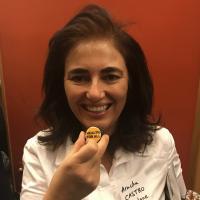
Dr. Arachu Castro, PhD, MPH, is Professor and Samuel Z. Stone Endowed Chair of Public Health in Latin America and Director of the Center for Health Equity in Latin America at the Celia Scott Weatherhead School of Public Health and Tropical Medicine at Tulane University. Her major interests are how social inequalities are embodied as differential risk for pathologies common among the poor and how health policies may alter the course of epidemic disease and other pathologies afflicting populations living in poverty. Dr. Castro works at the intersection of medical anthropology and epidemiology. She conducts research throughout Latin America and the Caribbean on health equity and social inequalities, women’s health and reproduction, and early childhood development in contexts of poverty. Dr. Castro has worked in Mexico, Argentina, Haiti, Cuba, Puerto Rico, Venezuela, Colombia, Peru, the Dominican Republic, Brazil, Nicaragua, Honduras, and Bolivia. Before joining Tulane in 2013, she was Associate Professor of Global Health and Social Medicine at Harvard Medical School. Among other awards, Dr. Castro is the recipient of the 2005 Rudolf Virchow Award and the 2010 Guggenheim Fellowship. In 2012 she was named Fellow of the Society for Applied Anthropology and is former President of the Society for Medical Anthropology. She is a member of the Executive Committees of the Health Equity Network of the Americas, the Sustainable Health Equity Movement, the Framework Convention on Global Health Alliance, IPPF’s International Medical Advisory Panel, and the World Humanitarian Forum Global Health Board. She is an elected corresponding member of the Cuban Academy of Sciences and a former member of the founding World Health Organization Strategic and Technical Advisory Group of Experts for Maternal, Newborn, Child, Adolescent Health & Nutrition. She has worked as a consultant for the Pan American Health Organization, the World Health Organization, UNICEF, UNAIDS, UNDP, the World Bank, and the Inter-American Development Bank. She has testified in the Foreign Relations Subcommittees on the Western Hemisphere of both the United States Congress and the United States Senate on COVID-19 vaccine access in Latin America and the Caribbean. Her research has been funded by the National Institutes of Health, the National Science Foundation, the Ford Foundation, Atlantic Philanthropies, the Maternal Health Task Force, UNICEF, the Pan American Health Organization, UNAIDS, the Bernard van Leer Foundation, Tulane University, and Harvard University, among others. She has a Ph.D. in social anthropology and ethnology from the École des Hautes Études en Sciences Sociales in Paris (1996), a Ph.D. in social sciences and health from the University of Barcelona (1997), and an MPH from Harvard School of Public Health in Boston (1998).
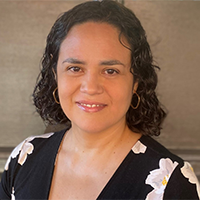
Martha Silva, PhD, MPH, has over 20 years of experience in international public health in the non-profit sector, academic institutions, and independently as a research and evaluation consultant. Her research focus includes health services research and social and behavior change evidence generation for program and policy improvement. From 2018-2023 she was Data Strategist and Innovation Team Lead for the Breakthrough RESEARCH project – a USAID cooperative agreement tasked with advancing social and behavior change by promoting evidence-based solutions to improve health and development programs around the world. In this role, Dr. Silva worked with B-R partners to identify strategic and innovative ways to collect, analyze, and use qualitative and quantitative data to strengthen program interventions in Africa and Latin America. Dr. Silva’s research has focused on factors affecting access to – and use of – contraception and abortion care, studying individual and community factors, healthcare setting, and system-level factors impacting abortion care pathways in settings where abortion is legal and illegal; including Mexico, New Zealand, Uruguay, Cameroon, and USA.
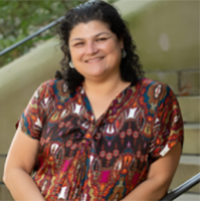
Eva Silvestre, PhD, works in the monitoring and evaluation of health and education programs domestically and internationally. Her educational background is in nutrition, anthropology, and public health, and she has experience with both quantitative and qualitative data collection. Dr. Silvestre has worked in HIV prevention, treatment, and communication, reproductive health, health information systems, health systems strengthening, and technology use in healthcare settings. She worked with a regional health bureau in Ethiopia to improve routine health information data quality and use. Dr. Silvestre is currently the Tulane team lead for Data for Impact, a USAID-funded project that focuses on supporting countries to generate and use high-quality data to improve their programs, policies, and -ultimately- health outcomes. The project also focuses on strengthening local partners' technical and organizational capacity to collect, analyze, and use data to support their move to self-reliance. She has been working on providing guidance on how to use routine data in evaluation. Dr. Silvestre is also currently the co-principal investigator on a new USAID-funded project--Global Health PEARL. Dr. Silvestre is also a former College Track Mentor for the Tulane Class of 2022 and is now working with the Tulane Office of Equity, Diversity, and Inclusion as a data strategist.
Students
Nora Badoui-Rodríguez, MD, MS
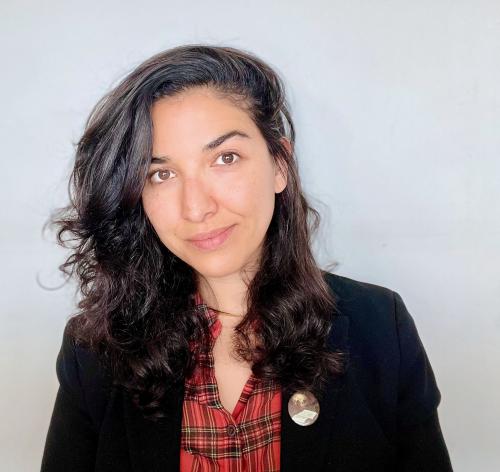
PhD student in International Health and Sustainable Development
Nora Badoui-Rodríguez, a family physician from Bogotá, Colombia, is in the first year of her Ph.D. in International Health and Sustainable Development at the Celia Scott Weatherhead of Public Health and Tropical Medicine at Tulane University. Since 2016, she has focused her research on the intersection of health and conflict, particularly interested in how health initiatives can contribute positively to conflict resolution. Before starting her Ph.D. program, Nora maintained an active clinical practice, which she believes is essential for understanding the individual-level impact of global health issues. She also served as an assistant professor at the Department of Preventive Medicine at Pontificia Universidad Javeriana and the Department of Public Health at Universidad Nacional de Colombia. In her role as a professor, she participated in research on topics such as healthy habits, arts in medicine, and medical education. Currently, her research explores the use of health as a tool for social cohesion and peace-building. She has been involved in multidisciplinary projects to enhance social cohesion through health literacy in rural Colombian communities affected by conflict. Now, she seeks to identify practical health strategies to reduce conflict and foster social cohesion between host and migrant communities.
Luciana Delgado González
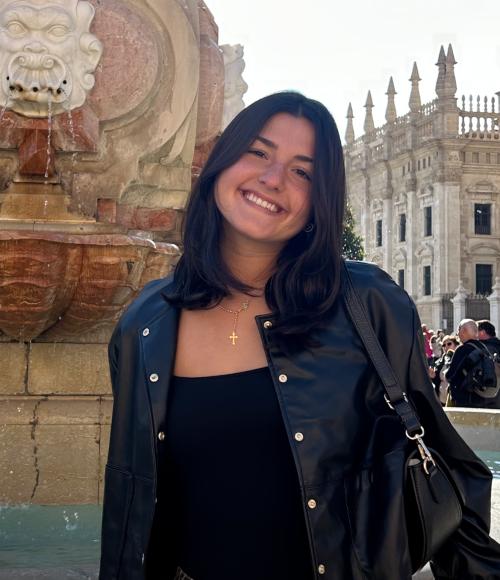
Major: Psychology and Health and Wellness. Expected graduation: 2027.
I am a Puerto Rican student at Tulane University with a passion for understanding the psychological and physiological aspects of human behavior. My academic journey has been shaped by my interest in forensic psychology and my commitment to mental health advocacy, particularly within marginalized communities. Through my studies, I aim to explore the intersections of psychology, neuroscience, and public health to better understand how trauma and mental health shape individual and social outcomes. As I prepare for a career in forensic psychology, I am especially interested in research on cognitive and emotional processes, mental health interventions, and the long-term effects of trauma. I aspire to contribute to the field through research that informs treatment approaches and enhances psychological well-being. After graduation, I plan to pursue a PhD in forensic psychology, where I can further investigate human behavior and contribute to advancements in mental health care.
Tanya García
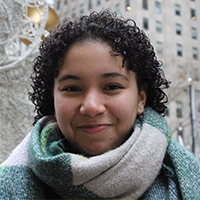
Major: Public Health; Minor: Spanish. Expected graduation: 2028.
I am a second-generation student of immigrant parents from the Dominican Republic and Puerto Rico. Born and raised in New York City, I have dedicated a significant portion of my career to the social and emotional development of diverse communities. During high school, I dedicated my time to a leadership position in the Latine student advocacy group, spreading awareness regarding Latin presence in New York and globally, and raising awareness of Latine Queerness. Additionally, I spent the last four years working at Planned Parenthood, helping improve sexual education for youth and families in my district, predominantly immigrant and Latino. Furthermore, I spent three years interning at an immigration center, where I helped with marketing, translation for Spanish-speaking clients, and data management. In his 1982 Nobel Peace Prize, Colombian author Gabriel García Márquez shared how injustices amongst government figures and communities have resulted from imposed colonial ideologies that continue to thrive today. Building on this concept, health has been the factor most fundamentally affected throughout the development of Latin American countries. Therefore, for communities and countries to truly develop, it is imperative to continue to work towards achieving health equity. Furthermore, this advancement in Latin America is not only beneficial for the region but also for the world as we work for a healthier, more just, and sustainable environment. During my college education, I am interested in deepening my understanding of global health issues, particularly in rural and marginalized communities. Post-graduation, I will pursue a master’s in public health and a PhD in Medical Anthropology.
Aria Gasca
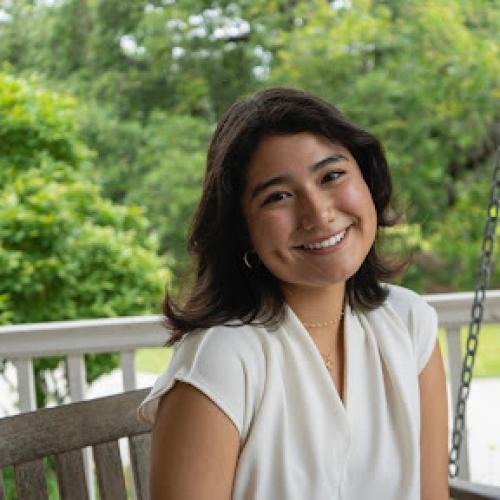
Major: Public Health and Gender & Sexuality Studies; Expected graduation: 2027.
I am a proud Mexican American woman from Los Angeles, a vibrant city with its share of struggles, but I can ultimately overcome and persevere. Growing up in Los Angeles, I had invaluable experiences of engaging with and learning from individuals from diverse backgrounds. As a Tulane Posse Scholar, I have had the privilege of interning with the National Institute for Reproductive Health and the Louisiana Coalition for Reproductive Freedom, where I have honed my leadership skills and developed a deep sense of responsibility and purpose in promoting health equity. These opportunities allowed me to immerse myself in advocacy and policy work, particularly in addressing systemic barriers to reproductive healthcare. My passion for healthcare in Latin America is deeply rooted in my Indigenous Mayan ancestry and a desire to bridge traditional and modern medicine. I am especially committed to improving prenatal and postnatal care for Black and Indigenous women, recognizing the critical need for culturally sensitive and equitable healthcare solutions. I firmly believe that access to healthcare is not a privilege reserved for some but a fundamental right for all. My work is driven by this conviction and my unwavering dedication to creating a more just, inclusive, and equitable healthcare system for all.
Alaia Gómez Arias
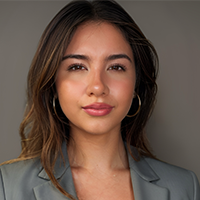
Major: Psychology; Minor: SLAM (Strategy, Leadership, and Analytics). Expected graduation: 2027.
I am Mexican and have experienced diverse cultures through living in Mexico, Houston, Washington DC, and now New Orleans. My interest in health equity in Latin America stems from my Mexican heritage and drive to address the challenges faced by marginalized populations. Through my academic and volunteer work, I’ve come to understand the need for culturally competent healthcare, and I am passionate about advocating for equitable access to these services in all regions. During my time in college, I’ve been interested in the intersection of psychology and healthcare, particularly in the context of marginalized communities. After graduation, I plan on attending medical or dental school, where I can further specialize in providing care to underserved populations.
Alicia Lyon
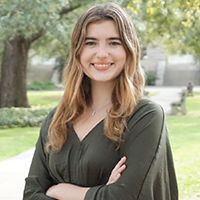
Majors: Public Health and Spanish; Minors: SLAM (Strategy, Leadership, and Analytics) and Latin American Studies. Expected graduation: 2026.
I am half Peruvian and half Irish, and I grew up in Texas. My passion for health equity in Latin America stems from my desire to ensure that everyone has access to healthcare. Since I have family in the region, it is a personal issue for me. After graduation, I plan to pursue a master’s degree in public health and work in the field of global health. In my free time, I love Zumba and am currently working toward becoming a certified Zumba instructor.
Giselle Rodríguez
Major: Public Health. Expected graduation: 2027
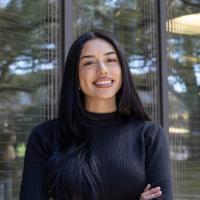
I am a first-generation Mexican American student from Dallas, Texas, with family from Oaxaca, Guanajuato, and Mexico City, Mexico. Growing up in a bilingual household and living among a diverse mix of cultures has strengthened my passion for equitable access to healthcare, particularly in supporting marginalized communities. My academic interests center on disease prevention and control, with a particular focus on maternal and child health, reproductive health, and obstetrics/gynecology. More specifically, the inequities that persist in these areas, particularly among Latina women, and working towards closing those gaps through community-centered and culturally competent care. I hope to contribute my perspective as a Latina woman in higher education while learning from others committed to health equity. Through collaboration, research, and advocacy, I want to expand my understanding of public health and the necessary tools needed for long-term change within these communities. My goal is to continue my education and pursue a master’s in public health, researching all aspects of women's health, learning through travel and fieldwork, and working closely with underrepresented communities.
Maddy Williams

Majors: Public Health, Latin American Studies, and Environmental Studies. Expected graduation: 2026
I am from Berkeley, California, and am a student at Tulane University. My interest in health equity in Latin America stems from the overlap between my areas of focus and understanding that health inequities cannot be prevented without local and cultural context. I have worked in Argentina and Ecuador, both in governmental roles and NGOs, where I gained extensive knowledge about various healthcare delivery systems and health promotion initiatives. I am passionate about delivering community-based interventions that accurately and effectively address the needs of the communities I serve. At Tulane, I am also involved in the club water polo team and the professional environmental fraternity, Epsilon Eta.
Former students
Yuanelis Báez
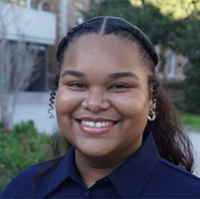
Majors: Political Science and International Studies; Philosophy with a concentration in Law, Morality, and Society. Expected graduation: 2025.
My interest in health equity in Latin America stems from my background and experiences as a Caribbean Hispanic person. Growing up as the child of Dominican immigrants, I witnessed firsthand the challenges that marginalized communities face in accessing healthcare and other essential services. These experiences fueled my passion for social justice and equity, particularly in the realm of health. I am pre-law and would like to pursue international law through immigration in the future.
Kristiane Maynard
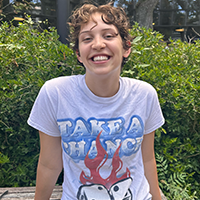
Majors: Neuroscience and Latin American Studies; Minor: Public Health. Expected graduation: 2025.
I am Latina from Costa Mesa, California, with close ties to my family in Honduras. This connection to my heritage makes my work and learning in this field meaningful. My interest in health equity in Latin America is deeply rooted in these personal and familial ties. I see health equity as a critical factor influencing migration, which has shaped my family’s experience. I am also passionate about understanding how systems of oppression impact our daily lives and our history, present, and future. As a member of the Latino community, I believe it's crucial to center Afro-Latino and Black voices, which are often excluded from Latinidad. Afro-Latino and Indigenous people have been instrumental in shaping Latin America in political, social, cultural, and economic sectors. Health equity is vital for this advocacy and for creating a future where everyone can enjoy life with access to the resources they need. During college, I’ve explored social justice and advocacy work, maternal and child health, women’s reproductive health, and Latino and Latin American histories through music and cultural studies, along with my interest in neuroscience. I am also keen to study further the prevalence of Alzheimer's and dementia in the Latino and Latin American communities, as well as the ways that experience can influence hormone regulation and physical health. After graduation, I plan to pursue a master’s in public health, focusing on maternal and child health, community health, and prevention strategies.
